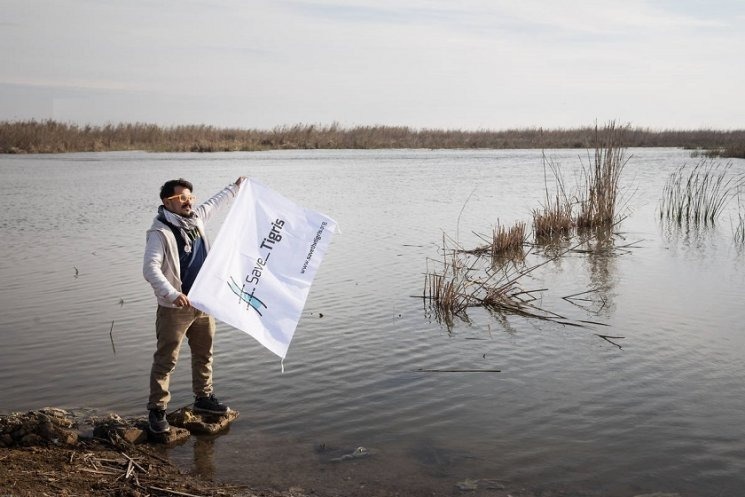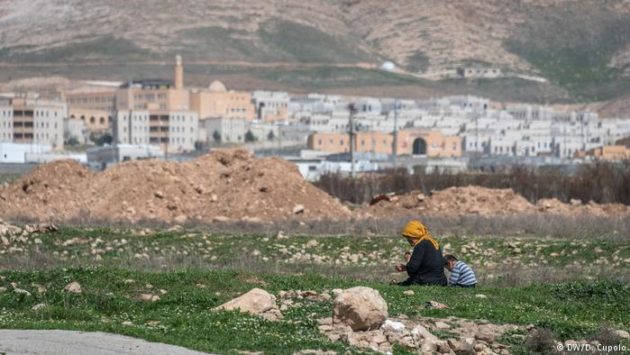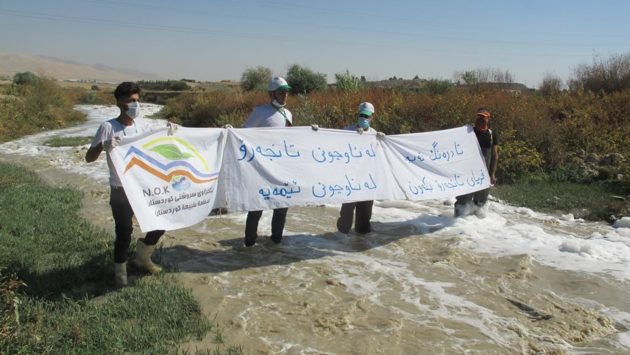Save the Tigris: Environmental Campaign against building Dams inside and outside Iraq
Husam Sobhi – Environmental Activist
In the year 2013, the Iraqi engineer and founder of “Iraq Nature”, organization for environmental affairs and Saving rivers, Azzam Aloosh, predicted that the Tigris River would turn into a small Creek and that would occur due to conflict between neighboring countries, once the Ilisu dam would have been completed. This prediction indeed occurred recently, despite Ilisu dam not functioning at its total capacity. A video appeared in social media and TV channel news, showing a young Iraqi man crossing Tigris River on foot, able to do so due to the great decline of water levels of the river, as drought continues in Iraq and the effects of climate change are exacerbated by desertification, with sand storms and decline in crops as a result of it. Nine years have passed since, for the first time, an environmental expert warned against the severe consequences of the Turkish dam project, calling for immediate action against it. Up till today, the Iraqi government has failed to act in this sense. On the contrary, it has ignored the matter and not taken it seriously, perhaps relying on Iraqi’s “submission” to decades of water cuts and sand storms. Today, however, disaster is approaching, with Iraq being one of the first countries hit by climate change on the planet.
With latent governmental responses and shortenings, the civil society seeks with all efforts to mobilize public opinion, in order to create and place pressure on countries to stop building dams and find alternative solutions. One of the strongest civil society movements in that matter – and one of the most active – is Save the Tigris, active in this field since 2012. Save the Tigris is an international campaign launched by a group of environmental and social, national and international activists to save the natural and cultural heritage of Tigris River from the long-lasting effects of dams and other big and destructive projects in neighboring countries such as Syria, Iran, and Turkey.
Salman Kheirallah, executive manager of Humat Dijlah association and international coordinator in Iraq, says: the main goal of Save the Tigris campaign, which was launched in 2011, is to put pressure to stop the construction of Ilisu Dam and to enlist the Tigris River and marshes to the global heritage list, which will prevent building future dams or any other bioenvironmental projects harming the river. Kheirallah adds: the campaign, with its international and national representatives, believes in the fight against the construction of large dams, given that these concrete barriers form a stroke for water paths with negative environmental, social and economical effects.

Members of the campaign – included ademics, experts, and individuals interested in the field of water and environment – are active in many Iraqi governorates from north to south to al-Masab area, against dams and projects building on the Tigris river, which brings nothing but environmental damage. The campaign also aims to spread its vision and goals protest rallies and on social media platforms. The campaign also seeks to spread awareness among young Iraqi citizens, as well as to direct suggestions, scientific and realistic solutions to the Iraqi delegation negotiating with the Turkish government.
Regarding dams and their negative effects on Iraq, the campaign also presents suggestions to the government and alternatives to building dams, such as the water harvesting system. Used in India and in other countries, it is a technique focused on harvesting rain waters and floods by digging water holes in agricultural areas and other areas.
With rising temperatures – already experienced – in the area due to climate change, the amount of lost water due to vaporization from dams is also increasing. Reports indicate that vaporization from Iraq reservoirs reduces the total water supply in the country by more than 10% each year (Institute of Iraqi energy, 2018).
According to the Strategic Study on Water and Wetlands in Iraq – known as SWLRI – published in 2015 by consultants specialized in Iraqi and international water resources, the demand for water in Iraq exceeds the available water resources, and the country does not need more dams or large reservoirs. Indeed, the former Minister of Water Resources Hassan al-Janabi stated that Makhool dam cannot be included in the water strategy as it is very harmful and would not bring any benefit.
Turkey’s water power – Water Leverage – is not only an environmental issue, but a regional geopolitical one, as Turkey recognizes that Iraq, geographically and politically, is not in a strong position and may have to compromise in order to save its rivers. Nine years ago, the security situation in Iraq deteriorated until one-third of the country ended under the terrorist group ISIS, and the country’s budget and its attention were cast on the military establishment until the liberation of governorates and cities in late 2017. During this period, Iraq’s relationship with Turkey declined, since the latter was accused by Iraq, Syria, and Iran of facilitating the movement of ISIS between Europe, Syria, and Iraq.
Moreover, Turkey is also conducting airstrikes on the villages of Dohuk governorate and in the Sinjar area, claiming the prosecution of members of the Kurdistan Workers’ Party, which it classifies as a terrorist organization. All these facts on the ground complicate the task of the Iraqi negotiating delegation on water and rivers and the position of Iraq in general. The relationship between Iraq and Turkey today, despite Iraq’s recent objection to airstrikes on areas in the Kurdistan region, varies to the fact that Kurdish Peshmerga Iraqi military forces support the Turkish endeavors in Sinjar. This change in attitude can be explained by Turkish pressure on the issue of rivers and the Iraqi government’s conviction that maintaining the relationship with Turkey is the first step in the success of negotiations and in obtaining some concessions from Ankara, in order to restore life in Baghdad and the Marshes.
Civil society may not be able to develop geopolitical solutions either, but it can be a tool for socially and environmentally sound water policies among the participants of the Tigris Basin and the Euphrates, namely cooperative coordination at the level of the river basin which includes independent civil society organizations, communities, municipalities, researchers and regional administrations, who in turn reach for solutions to sharing water without damage to the ecosystem. We don’t need more dams and more irrigation projects. The strategic objectives should be to restore the river’s ecosystem and return to less water-used crops in agriculture, as well as to remove some dams. Hydropower production should be limited to a low level. Water solutions should be developed mainly at the local level, especially the sub-basin level, taking into account the needs of people and the ecosystem.




